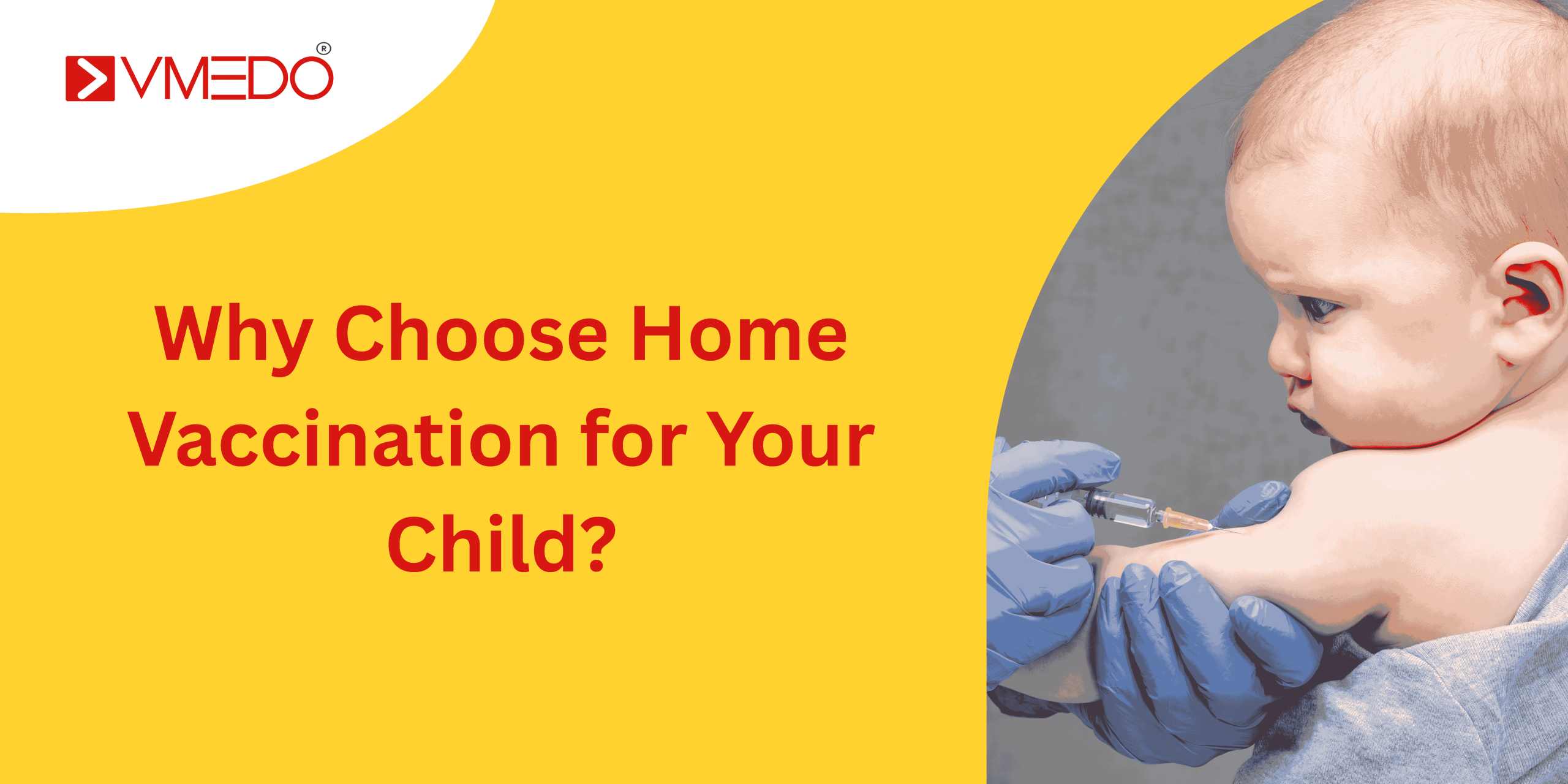As a parent, ensuring your child’s health and well-being is one of your highest priorities. Immunization is a critical part of safeguarding your child against various infectious diseases, but getting to the clinic or hospital for regular vaccinations can often feel like a daunting task. From long waiting hours and crowded hospitals to concerns about exposure to infections, traditional vaccination methods are not always the most convenient or safe, especially in today’s fast-paced world.
This is where at-home vaccination services come into play. With the rise of home healthcare services, parents now have the option to vaccinate their children in the safety and comfort of their homes. This blog delves into why at-home vaccination is becoming the preferred choice for modern families, exploring its benefits, safety, and impact on immunization rates.
What is At-Home Vaccination?
At-home vaccination refers to the administration of vaccines by trained healthcare professionals at the patient’s home instead of a clinic or hospital. It includes:
-
Routine childhood immunizations
-
Catch-up immunizations
-
Seasonal flu shots
-
Special vaccinations for travel or outbreaks
The service is typically offered by certified healthcare organizations, clinics, or digital health platforms that provide well-trained nurses or doctors to conduct the procedure at your doorstep.
Why Immunization is Crucial for Children
Before diving into the benefits of at-home vaccination, let’s revisit why immunizing your child is so important:
-
Prevention of Serious Diseases: Vaccines protect against life-threatening diseases like measles, polio, diphtheria, hepatitis, and more.
-
Community Immunity (Herd Immunity): When more people are vaccinated, it reduces the spread of infections, protecting those who can’t be vaccinated due to medical reasons.
-
Healthy Growth and Development: Immunized children are less likely to fall ill frequently, leading to better physical and cognitive development.
-
School and Travel Requirements: Most schools and countries require vaccination records for admission or entry.
Despite the benefits, many children still miss their vaccines due to logistical or medical challenges — a gap at-home vaccination services aim to bridge.
12 Reasons to Choose At-Home Vaccination for Your Child
1. Comfort and Convenience
Taking your child to a hospital, waiting in queues, and dealing with paperwork can be time-consuming and stressful. At-home services offer:
-
Flexible appointment scheduling
-
No travel hassles
-
Reduced waiting time
-
Comfort of the home environment
Parents can save time and energy, while children remain in familiar surroundings, making the experience more pleasant.
2. Reduced Risk of Infection Exposure
Hospitals and clinics are hubs for various infections, especially airborne illnesses like COVID-19 or seasonal flu. Infants and toddlers have underdeveloped immune systems, and unnecessary exposure can be risky. At-home vaccination:
-
Minimizes contact with other sick individuals
-
Ensures hygienic, sanitized procedures
-
Offers safety for immunocompromised or medically vulnerable children
3. Better Compliance and Timely Vaccination
Missed or delayed vaccines can reduce their effectiveness and leave your child vulnerable. Home vaccination services:
-
Provide reminders and follow-ups
-
Offer complete vaccination schedules
-
Increase adherence to national immunization timelines
Timely vaccinations ensure continuous protection as per WHO and national guidelines.
4. Child-Friendly Environment
Some children develop a fear of hospitals due to the sterile atmosphere and presence of other crying or ill patients. At home:
-
Children feel safe and relaxed
-
They’re distracted by toys or family members
-
Healthcare professionals can administer vaccines with less resistance
This reduces trauma and anxiety related to shots, making it easier for both children and parents.
5. Access to Trained Professionals
Contrary to popular belief, at-home services don’t compromise on quality. Reputable providers ensure:
-
Only qualified and registered nurses or pediatricians visit
-
Vaccines are stored and transported according to WHO cold chain protocols
-
Detailed documentation and post-vaccination guidance are provided
You get the same — if not better — standard of care compared to traditional clinics.
6. Emergency Readiness and Monitoring
Many parents worry about post-vaccine reactions. At-home professionals are equipped to:
-
Monitor for side effects like fever, swelling, or allergic reactions
-
Provide emergency medications if needed
-
Offer guidance on managing post-vaccine discomfort
Parents can call back or consult via telehealth for any concerns post-procedure.
7. Customized Care Plans
Each child is different, and sometimes special considerations are required due to:
-
Premature birth
-
Allergies
-
Chronic illnesses
-
Missed doses or alternative vaccination schedules
At-home services can customize care plans based on your child’s medical history and vaccination records.
8. Ideal for Working Parents
Busy professionals often struggle to find time for hospital visits. With at-home vaccinations:
-
You can book slots after work or on weekends
-
Both parents can be present without applying for leave
-
You save on travel time and disruption of daily schedules
It’s a modern solution for modern parenting.
9. Good for Multi-Child Families
Families with multiple children face logistical nightmares when all need vaccinations. At-home service can:
-
Immunize all children in one visit
-
Reduce overall stress and disruption
-
Offer bundled services and discounts
It simplifies parenting for households with more than one child.
10. Supports Immunization in Rural or Underserved Areas
In many parts of India and other developing nations, access to pediatric clinics is limited. At-home services:
-
Reach remote or semi-urban areas
-
Bridge the gap in healthcare infrastructure
-
Partner with government schemes or NGOs for affordable care
This improves overall immunization coverage.
11. Digital Records and Easy Access
Most home vaccination providers offer digital records of vaccines administered. This includes:
-
Automatic updates on mobile apps or via email
-
Easy access to documents for school admissions or travel
-
Alerts on due vaccines based on the child’s age
No more maintaining physical vaccine booklets that get misplaced!
12. Empowering Parents through Education
During a home visit, parents can:
-
Ask questions about vaccine types, side effects, and long-term benefits
-
Understand the vaccination schedule better
-
Get guidance on nutrition and post-vaccine care
This personalized interaction builds trust and awareness.
Safety and Legality: Is It Safe to Vaccinate at Home?
Yes — as long as you choose a certified, reputed service provider. Key safety checks include:
-
Vaccines should be WHO pre-qualified and from government-approved sources.
-
The nurse or doctor should carry ID proof, a medical license, and cold chain equipment (like a vaccine carrier with ice packs).
-
The procedure must follow standard hygiene protocols (gloves, sanitizers, sterile syringes).
-
A consent form must be signed, and a proper bill/receipt should be issued.
Always verify credentials and read reviews before booking an at-home vaccination service.
Common Vaccines Offered at Home for Children
At-home services typically cover all key childhood vaccines, including:
-
BCG (Tuberculosis)
-
Pentavalent vaccine (DTP + Hep B + Hib)
-
IPV/OPV (Polio)
-
MMR (Measles, Mumps, Rubella)
-
Varicella (Chickenpox)
-
Typhoid
-
HPV (for teens)
Seasonal or travel-related vaccinations may also be available upon request.
Conclusion
The world is evolving, and so are healthcare delivery models. At-home vaccination for children is not just a convenience — it’s a smart, safe, and compassionate choice for modern parents who want the best for their children without compromising on comfort or safety.
From reducing infection exposure to enabling timely immunization and offering personalized care, the benefits of home vaccination are truly transformative. With the right provider, you can ensure your child gets protected while staying in their happy place — home.



